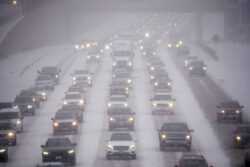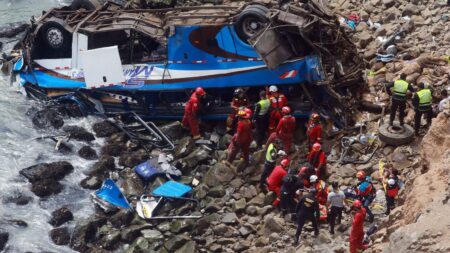Winter storm causing US chaos with blizzards and heat wave
A severe winter storm is causing chaos across North America, with blizzards hitting several states and a heat wave affecting the southeastern parts of the US.
Over 75 million people in 28 states have been issued with winter weather warnings as the storm spans across 1,300 miles from Nebraska to New Hampshire.
Blizzards have resulted in the closure of schools and businesses in the Dakotas, Minnesota and Wisconsin, and residents in these areas are bracing themselves for up to 2ft (60cm) of snowfall, the most significant in 30 years.
The storm has also led to the cancellation of over 1,700 flights.
Los Angeles blizzard warning, whilst record highs in DC

In a rare occurrence, Los Angeles, California, known for its warm weather, has issued a blizzard warning as icy weather is forecasted, with snow and winds up to 75mph predicted in the mountains and foothills of Ventura and Los Angeles County.
In contrast, record-breaking high temperatures for this time of year have been recorded in the southern parts of the US. Washington DC is expected to break a 150-year-old record with temperatures set to hit 80F on Thursday.
Canada feeling the impact
Canada is also feeling the impact of the winter storm, with weather warnings in place in several parts of the country, including Toronto, where residents are expecting 4-10in (10-15cm) of snow, ice pellets and possible freezing rain.
The country had just experienced record-breaking warm temperatures for February before the cold snap arrived, which has resulted in flights being cancelled, and parts of Alberta and the prairies facing extreme cold warnings, with temperatures dropping to -40F (-40C) range with wind chill.
What is climate change?
Climate change refers to the long-term changes in Earth’s climate, including changes in temperature, precipitation patterns, and weather events such as hurricanes, droughts, and heatwaves, that have been observed over several decades or longer. Climate change is largely driven by human activities, particularly the burning of fossil fuels (such as coal, oil, and gas) that release large amounts of greenhouse gases into the atmosphere, trapping heat and warming the planet. Climate change has significant and far-reaching impacts on the environment, economy, and human society, including rising sea levels, more frequent and severe weather events, food and water insecurity, and increased risk of disease.
Does climate change cause extreme weather events?
Climate change can contribute to the occurrence of extreme weather events such as heatwaves, droughts, heavy rainfall, and intense storms. The increased concentration of greenhouse gases in the atmosphere, primarily carbon dioxide, traps heat and warms the planet, leading to changes in global weather patterns. These changes can cause shifts in precipitation patterns and contribute to the intensity and frequency of extreme weather events.
While it is difficult to attribute any individual weather event to climate change, scientists have found that climate change increases the likelihood of certain types of extreme weather events occurring. For example, a warmer climate can lead to more frequent and severe heatwaves, and warmer ocean temperatures can cause stronger and more intense tropical storms and hurricanes.





